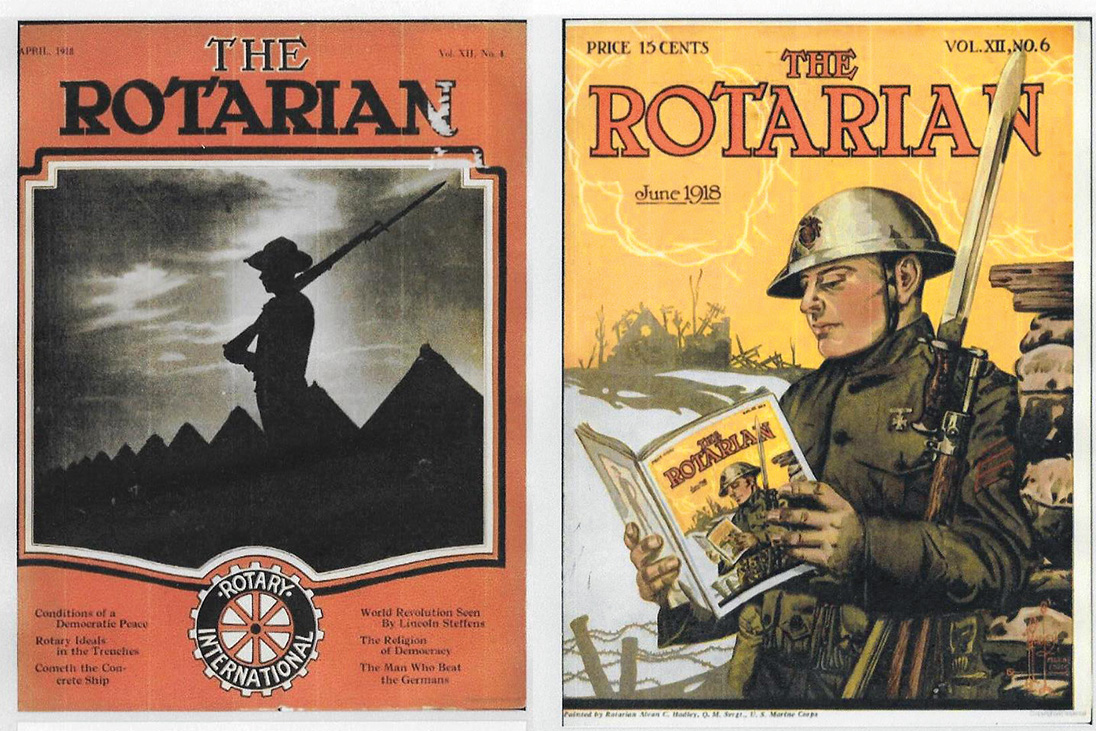It was on November 11th, 1918, when the guns finally fell silent to end the First World War.
The Armistice was signed at 5am, and came into effect five hours later bringing to an end four years of what was then described as ‘the war to end all wars’.
This was a bitter struggle which had eclipsed all previous wars with its scale of destruction – historians estimate that 10 million men lost their lives on the battlefield.
The Rotary Wheel was the magazine which served Rotarians in Britain at the time.
Its leading article from the November 1918 issue stated: “At the time of going to press flags are flying, bells are ringing and there is general public rejoicing… although peace has not yet been declared, to all intents and purposes this bloody war is over. But we must not rest because of that. It is certainly a matter for thankfulness, but we in Rotary know that instead of this being the end, it is only the beginning.”
As we reflect on 100 years since the end of the First World War, what of Rotary?
When the war was triggered on June 28th, 1914, by the assassination of Archduke Franz Ferdinand of Austria, the British Association of Rotary Clubs, as it was then known, was still in its infancy.
And yet, there is a school of thought that the community spirit which bonded these isles during the war years was the making of Rotary.


The events of World War I were covered extensively in Rotary publications both in the UK and USA, including in The Rotarian magazine in April and June of 1918.
The distinguished Rotarian, Roger Levy, a long-serving editor, and who was Deputy Secretary of Rotary in Great Britain & Ireland between 1954 and 1959, suggested as much in his 1978 book about the history of the organisation.
He wrote: “Had it not been for the war, the whole story of Rotary in the British Isles might have been very different and, conceivably much shorter.
“There had been a measure of antipathy to anything as brash and so American as Rotary, but entry of the United States into the war (in April 1917) had done something to bring the two nations closer together, and to engender a greater measure of trans-Atlantic ways.”
Undoubtedly, with the fellowship gained from the new clubs, Rotary was given a sense of purpose created by the need to help many people at home, to assist refugees, to aid employment for the returning wounded and to find ways to look after disabled servicemen, widows and orphans.
The casualties and fatalities had wrecked a whole generation and their families. The clubs had raised funds for the war effort and helped in times well before the National Health Service and the welfare state.
Rotarians had entertained troops, as well as the children and orphans of those away fighting. They had helped to extend hospitals and work in them. They had found numerous ways to exemplify the Rotary motto of ‘service above self’.
Eighteen months before Armistice Day, The Rotary Wheel in its April 1917 issue, had addressed the subject of ‘Rotary and the next war’.
The article discussed what it believed would be the inevitable fight that would take place once combat had ended.
It also discussed what would be needed for the future.
Had it not been for the war, the whole story of Rotary in the British Isles might have been very different and, conceivably, much shorter.”
The article also foresaw that the whole energy of the British nation, and its Allies, would be needed, but how?
In 1917, the nation was engaged in looking after its own businesses, usually with greatly depleted workforces.
However, the article concluded that service organisations could fill the gap.
The article reflected: “Rotary is such an organisation. Rotary stands for co-operation and service; two factors that will be paramount in the near future, just as they are now.
“Rotary is a machine capable of doing much and varied work. We don’t know at present exactly what work will be required of it after the war, but we do know that it is capable of doing much.
“Meanwhile, let us keep this machine well-oiled and in good running order, so that when it is required for the country’s service it will not be broken and rusty.
“This is a simple matter, and quite within the powers of the busiest man.
“All that is necessary is to keep one’s own club going by attending meetings regularly and by doing the little required of one as an individual member, as well as by helping, in such measure as one can, the spread of the movement to other centres.”
Prophetic words indeed, and as true today as they were just over 100 years ago.


























































